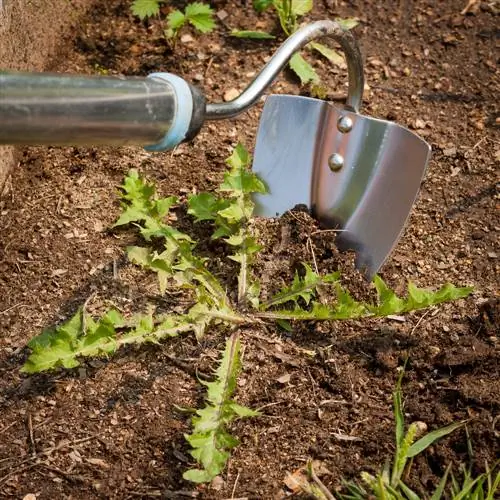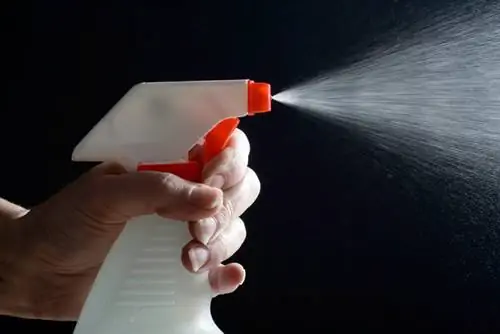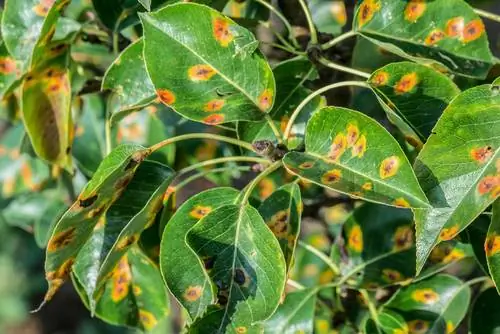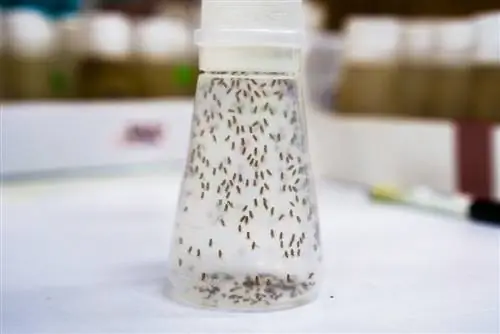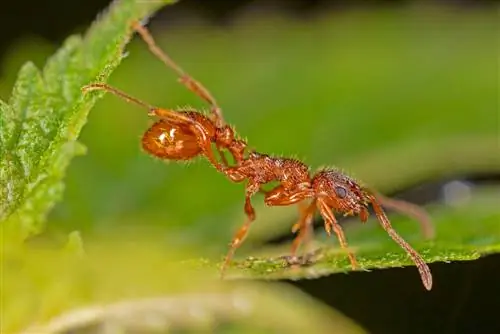- Author admin leonars@hobbygardeners.com.
- Public 2023-12-16 16:46.
- Last modified 2025-01-23 11:22.
Gardening could be so nice if it weren't for the constant pulling of weeds. Dandelions, daisies, groundweed, couch grass and the like grow everywhere and seem impossible to get rid of. With these home remedies you can keep your garden virtually weed-free without any toxic substances.
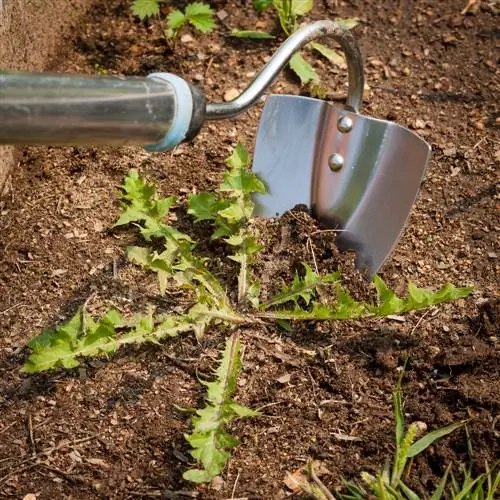
Which home remedies help against weeds in the garden?
Home remedies for weeds include mechanical weeding, nettle spray, mulching and hot water. These environmentally friendly methods help to effectively control weeds without toxic chemicals and protect the garden soil and adjacent plants.
Remove weeds in beds
As soon as the vegetable or flower bed is cleared of all weeds and you sit up with a sore back, the unloved plants you just removed seem to grow back again. So it's no wonder that many desperate gardeners prefer to resort to chemicals when faced with this Sisyphean task. But that is not necessary at all - and also does not make sense, since plant killers do not differentiate between weeds and crops - because there are some home remedies that are completely free of side effects and can be used in vegetable and perennial beds.
Mechanical weed removal
You probably won't like reading this, but weeding - mechanical weed removal - is by far the best method. However, you don't have to slide on your knees in the bed and spend hours digging out couch grass, because with a few tricks it's much easier to pluck them out. This means that it is best to go into the garden immediately after a heavy downpour: then the soil is well moistened and so loose that you can easily pull the unwanted herbs out of the soil.
Suitable tools for sore backs
With the right tools, you don't even have to bend down, saving your back. Choose garden tools with a long handle so you can work standing or sitting. The following table provides you with an overview of suitable devices.
| Garden tools | Appearance | Usage |
|---|---|---|
| Sauzahn | Sickle-shaped tine with plowshare at the tip, attached to the long handle | Soil loosening |
| Pendulum hoe | double-edged, movable steel blade on a long handle | Weed removal by reciprocating back and forth movements, weeds can be left as mulch |
| Garden hoe | wide, single-edged metal blade on a long handle | Weed removal between rows of plants or close to crops |
| Field hoe | narrow, long metal leaf on a long handle | Removal of deep-rooted weeds, loosening of soil |
| Schuffel (pulling hoe) | Metal leaf with slanted, serrated edge on a long handle | Weed removal by pushing or pulling, loosening the soil |
| Weeder | Lancing device on a long handle, preferably with a T-handle and foot plate | Removal of root weeds |
Mulching
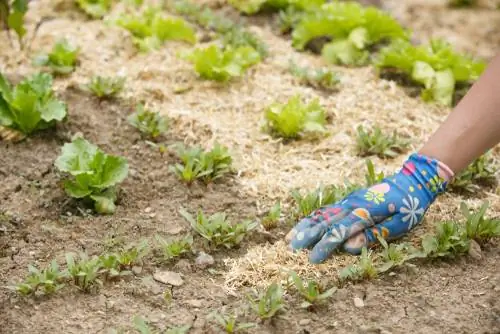
Mulch or hay takes away the light from weeds
Weeds only grow where they have room to grow: there is no bare earth in nature, as fallow areas are quickly taken over by wild herbs and other fast-growing plants. You should therefore not leave any free areas in the garden, as unwanted growth spreads just as quickly. Therefore, cover unplanted ground - for example between rows of beds - with a thick layer of mulch. This has several advantages: On the one hand, the mulch layer suppresses the growth of weeds, on the other hand, bark mulch and other materials also prevent the soil from drying out and you have to water less. Some mulching materials can also be used for surface composting and provide the plants with valuable nutrients. In addition to bark mulch (note: this removes nutrients from the soil, which is why you have to fertilize it additionally!) and bark compost, these mulching materials are suitable:
- Lawn cutting
- Wood chips
- Straw
- gravel
- Green manure plants (phacelia, spinach, yellow mustard etc.)
- chopped vegetable and garden waste
Make sure that the applied layer is at least five centimeters thick.
Versatile: nettle manure
Stinging nettle manure is a real all-round talent in the garden, as it can be used not only to repel insects and strengthen plants, but also to combat weeds. And this is how it works:
- Put one kilogram of fresh, crushed nettles in ten liters of water.
- Use rain or well-stale tap water.
- Pour the mixture into a plastic bucket or earthenware pot.
- Do not use a metal container as this will lead to undesirable chemical reactions.
- Place a grate or jute cloth over the opening of the vessel.
- Let the fermenting manure stand for at least four days.
- Stir daily.
- Stir a handful of stone powder or some valerian flower extract into the manure. This alleviates the unpleasant smell.
The manure is ready for use when it has taken on a dark color and no longer foams. Depending on the weather, this will happen after about one and a half to three weeks. You do not need to dilute the manure for weed control purposes. Simply pour or spray directly over the leaves of the plants to be eliminated. However, be careful not to spray neighboring crops and ornamental plants. The product should also not be used in the immediate vicinity of fountains or garden water - keep a distance of at least ten meters. Repeat the treatment if necessary.
Excursus
Ground cover in the perennial bed
Weeds can be easily suppressed in perennial beds by using ground cover plants - since the ground here is already overgrown, the plants hardly have a chance to develop. The selection is huge, so there is a suitable species for every taste and every garden. This method is also suitable for planting under trees and keeping these areas free of weeds.
Removing weeds from paved garden areas
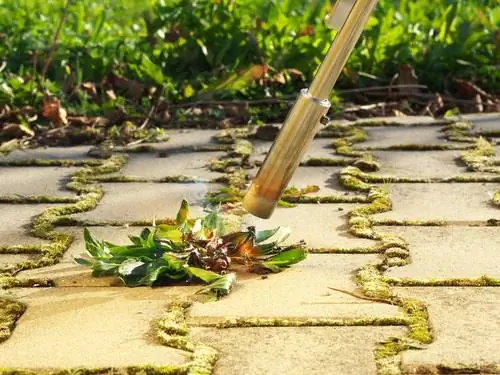
Flaming weeds is an environmentally friendly method
What works well in the bed is not practical on paved paths and areas such as the paved terrace or the driveway. Heat or mechanical methods are particularly helpful against weeds growing in the joints.
- Hot Water: Pour boiling water over the weeds.
- Flaming: Burn the herbs with a gas burner.
- High-pressure cleaner: Simply rinse away the growth with a high-pressure cleaner.
The disadvantage of these methods, however, is that usually only the above-ground parts of the plant are removed. The roots, on the other hand, remain in the ground, so that the plants sprout again after a while and you have to repeat the treatment. Mechanical methods of removal, for example using a joint scraper or a knife, can help. It may also be necessary to refill the joints as the filler material has been removed.
Excursus
Sealing joints
Prevention is the best way to prevent weeds in paving joints: grout the stones with a sandy paving joint mortar. This is permeable to water, so the area is not completely sealed, but no longer allows weeds to pass through. Joint sand or a synthetic resin mixture also serve this purpose, although the latter contributes to sealing the surface.
How to get weeds out of your lawn
If weeds grow in the lawn, then this growth clearly shows you one thing: the growing conditions are not optimal for grasses, which is why other plants can spread. Here you have to get to the roots of the cause, because if you remove them, the weeds will also disappear.
“It is extremely unfortunate that people refer to such valuable herbs as weeds, whose remarkable properties we are now gradually discovering.” (André Voisin, author of numerous gardening books)
The weeds show you what the lawn's soil is like: For example, if you laboriously pull out the tough roots of the buttercup, then their presence indicates that the soil is compacted and moist. The same applies to indicator plants such as sorrel, wildflower and broadleaf plantain. They strongly advise you as a gardener to improve and loosen the soil with humus.
An indication of compacted and hardened soil is also provided by pioneer plants such as dandelion, goose thistle and mountain fleas, while field mustard, black nightshade, nettles and burdock bedstraw occur mainly on nutrient-rich soils with a high nitrogen content.
The following article shows what causes moss in the lawn and how you can get rid of it:

Stay away from these homemade weed killers
There are also numerous home remedies circulating on the Internet (and not only there) that hobby gardeners like to use to combat weeds. However, we would strongly advise you not to use the following products, as although they can be found in your household, they are by no means non-toxic or “gentle”.
- Vinegar / vinegar essence / acetic acid / vinegar cleaner / apple cider vinegar: leads to acidification of the soil, breaks down very difficult and quickly reaches the groundwater
- S alt / hydrochloric acid: Soil is overs alted, which also has negative effects on useful and ornamental plants
- Citric acid: similar to vinegar
- Magnesium chloride: only use if there is a magnesium deficiency in the soil, otherwise there is a risk of over-fertilization
- Detergent: conventional detergent contains many toxic substances that kill soil-living microorganisms and therefore have no place in the soil
In addition, the use of the products mentioned on areas not used for gardening or agriculture (i.e. on all paved garden areas such as paths, driveways, terraces, etc.) is anyway prohibited by the Plant Protection Act and can result in a fine. Although there is a court ruling from 2017 in which such a ruling was overturned, the courts are quite divided on this issue - public order offices and agricultural chambers continue to punish the use of vinegar and s alt in particular on sealed surfaces.
Frequently asked questions
Why do I actually need home remedies when there are commercially approved weed killers for the garden?
Just because a weed killer is approved for hobby gardening, it is still not safe. Most of these herbicides are based on ingredients such as acetic acid, pelargonic acid, etc. and are therefore extremely dangerous for you as well as for the useful and ornamental plants as well as for the numerous animals in the garden. Agents like Roundup are also highly questionable as they contain glyphosate, which is considered to be carcinogenic.
I've heard that baking soda dissolved in water also helps against weeds. Is that true?
It's not baking powder that works against weeds, but baking soda. Baking soda used to be the main ingredient in baking powder, but today the small bags usually contain the acidulant potassium hydrogen carbonate. This has no effect on weeds.
How can we control weeds?
It is best to prevent weeds as much as possible by laying out weed fleece and black films. Both can be easily installed in the bed and covered with fresh soil.
Tip
Do not throw weeds into the compost and, above all, do not leave root weeds lying in the bed: the plants can, if they are already ready to seed or are about to go to seed, continue to multiply by self-sowing or sprout again from small parts of the roots.

